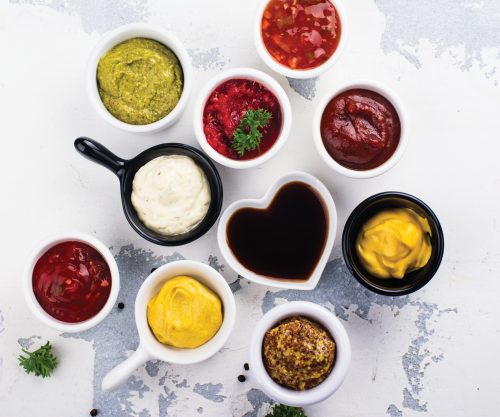Everything about the Duty of an Emulsifier in Food and Its Value in Modern Cuisine
Emulsifiers are critical in contemporary food, helping with the blend of immiscible fluids like oil and water. Their ability to maintain blends improves the texture and flavor of different food. From salad dressings to baked products, emulsifiers play a significant role in both commercial and home food preparation. The science behind their function and the future developments in their usage remain much less discovered. What extra could be uncovered regarding these necessary culinary agents?
Recognizing Emulsification: The Scientific Research Behind the Refine
Emulsification might seem like a simple cooking strategy, it entails complex clinical concepts that are important for creating stable blends of immiscible fluids, such as oil and water. At the heart of this procedure lies the principle of surface tension, which avoids the two fluids from mixing normally. Emulsifiers, materials that lower surface area stress, play a crucial role in facilitating the mix of these fluids. They possess both hydrophilic (water-attracting) and hydrophobic (water-repelling) residential properties, permitting them to secure themselves at the user interface between oil and water.
When an emulsifier is introduced and the blend is agitated, it forms a safety barrier around spread beads of one liquid within the other, supporting the blend. This action not just enhances appearance and mouthfeel in food products yet additionally adds to their visual charm. Emulsifier In Food. Recognizing the science behind emulsification is essential in modern cuisine, enabling chefs to develop a variety of sauces, dressings, and emulsified recipes
Typical Kinds Of Emulsifiers Made Use Of in Food
Emulsifiers are important ingredients in the food sector, playing a crucial role in stabilizing mixtures of oil and water. Numerous kinds of emulsifiers are commonly made use of, each with distinct buildings suited for different applications. Lecithin, stemmed from soybeans or egg yolks, is one of one of the most preferred natural emulsifiers, usually discovered in dressings and chocolates. Mono- and diglycerides, which are obtained from glycerol and fatty acids, are widely used in baked items and margarine to enhance texture and extend rack life. One more usual emulsifier is polysorbate 80, preferred for its ability to boost the consistency of ice creams and sauces. In addition, xanthan gum tissue and guar gum act as thickening agents that also add to emulsification in gluten-free items. These emulsifiers are indispensable to creating a secure, tasty item in modern food formulations, ensuring a pleasant sensory experience for consumers.
The Role of Emulsifiers in Numerous Food Products
A range of food products count on emulsifiers to attain preferred structures and security. These compounds help with the blending of immiscible fluids, such as oil and water, which is necessary in numerous processed foods. For circumstances, in salad dressings, emulsifiers help keep a consistent mixture, stopping separation and improving service life. In baked goods, they add to an uniform crumb framework and wetness retention, boosting general top quality.
Emulsifiers likewise play a substantial duty in milk items, such as ice cream and yogurt, where they support fat blobs, making certain a smooth mouthfeel. Additionally, in sauces and spices, they improve viscosity and improve spreadability. This functionality is essential in the manufacturing of chocolates, margarine, and mayonnaise, where a natural product is needed. Generally, using emulsifiers in different foodstuff is indispensable to modern food production, enhancing stability and uniformity throughout a large range of products.
Just How Emulsifiers Enhance Appearance and Taste

When incorporated into foodstuff, emulsifiers substantially boost both appearance and flavor, developing a more satisfying eating experience. These compounds promote the blending of active ingredients that usually do not blend well, such as oil and water, causing a smoother, creamier uniformity. This not only enhances mouthfeel however additionally enables tastes to disperse equally throughout the item, magnifying the overall preference.

Emulsifiers in Home Food Preparation: Tips and Techniques
Exactly how can home chefs properly make use of emulsifiers to improve their dishes? Emulsifiers play a necessary duty in attaining preferable appearances and flavors in homemade recipes. For circumstances, utilizing egg yolks in mayo or hollandaise sauce allows for a stable emulsion, integrating oil and water successfully. Home cooks can also trying out mustard, which acts as an emulsifier in vinaigrettes, making certain a smooth uniformity.
In cooking, incorporating lecithin, found in egg yolks or soy, can enhance dough security and dampness article source retention. Furthermore, utilizing industrial emulsifiers like xanthan gum or guar gum can assist thicken sauces and dressings while preserving a luscious mouthfeel.
When developing ice lotions or whipped toppings, emulsifiers can prevent ice crystal development, leading to a smoother structure. By grasping these strategies, home cooks can significantly boost their cooking creations, giving consistent and enjoyable dishes that showcase the power of emulsification.
The Future of Emulsifiers in Culinary Advancement
As the cooking world proceeds to advance, the duty of emulsifiers is poised to end up being progressively innovative and diverse. Developments in food science are leading to the development of new emulsifying agents obtained from natural sources, which provide to health-conscious customers and enhance the sensory top qualities of meals. Technologies such as plant-based emulsifiers are obtaining grip, enabling cooks to develop vegan and allergen-free alternatives without compromising structure or flavor.
In addition, using emulsifiers in molecular gastronomy is increasing, allowing chefs to try out unique appearances and presentations that captivate diners. As sustainability ends up being a priority, the future might see a change towards eco-friendly emulsifiers that lower ecological effect.
Eventually, emulsifiers will certainly remain to play an essential role in culinary advancement, linking the gap between tradition and modernity, and permitting cooks to press the borders of creative thinking in their important link kitchens.
Frequently Asked Inquiries

Are Emulsifiers Safe for Individuals With Allergic reactions?
Emulsifiers can be safe for individuals with allergic reactions, depending on their specific sensitivities. However, particular emulsifiers, stemmed from allergenic sources like soy or eggs, might set off reactions, requiring mindful active ingredient analysis and consultation with health care experts.
Exactly How Do Emulsifiers Impact Food Life Span?
Emulsifiers boost food life span by maintaining mixtures, stopping separation, and reducing microbial growth. This security assists keep structure and flavor with time, allowing products to remain appealing and secure for intake longer than without emulsifiers.
Can Emulsifiers Be Derived From All-natural Sources?
Yes, emulsifiers can be stemmed from natural resources such as plants, eggs, and dairy products (Emulsifier In Food). These natural emulsifiers help support mixes, improving structure and consistency in numerous food applications while being favored for health-conscious consumers
What Are the Environmental Effects of Emulsifier Production?
The ecological impacts of emulsifier production include source exhaustion, environment devastation, and contamination from synthetic processes. Natural emulsifier sourcing can reduce some effects, however overall, industrial practices still position significant ecological difficulties to communities worldwide.

Exist Vegan Emulsifiers Available in the Market?
Yes, there are numerous vegan emulsifiers readily available in the marketplace, such as lecithin stemmed from soy or sunflower, guar periodontal, and xanthan periodontal. These alternatives accommodate plant-based diets without jeopardizing emulsifying properties.
Emulsifiers are necessary ingredients in the food industry, playing an important function in maintaining blends of oil and water. A variety of food products count on emulsifiers to achieve preferred appearances and stability. When incorporated right into food products, emulsifiers considerably enhance both appearance look at this site and flavor, developing a more satisfying eating experience. Additionally, emulsifiers can support air pockets in whipped items like creams and mousses, leading to a light and ventilated structure. Emulsifiers boost food rack life by stabilizing blends, avoiding separation, and decreasing microbial growth.